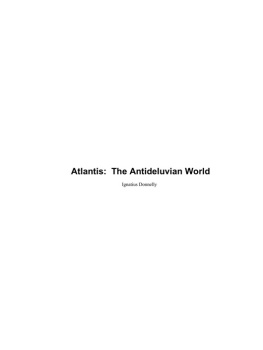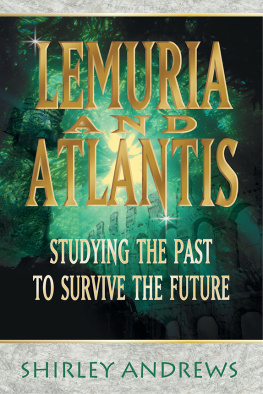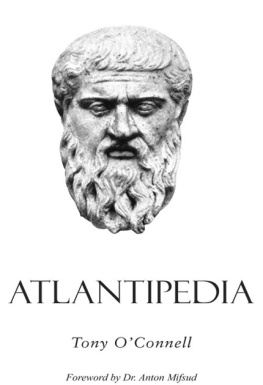Ignatius Donnelly - Atlantis: The Antideluvian World
Here you can read online Ignatius Donnelly - Atlantis: The Antideluvian World full text of the book (entire story) in english for free. Download pdf and epub, get meaning, cover and reviews about this ebook. year: 2001, publisher: Indypublish.Com, genre: Art. Description of the work, (preface) as well as reviews are available. Best literature library LitArk.com created for fans of good reading and offers a wide selection of genres:
Romance novel
Science fiction
Adventure
Detective
Science
History
Home and family
Prose
Art
Politics
Computer
Non-fiction
Religion
Business
Children
Humor
Choose a favorite category and find really read worthwhile books. Enjoy immersion in the world of imagination, feel the emotions of the characters or learn something new for yourself, make an fascinating discovery.
- Book:Atlantis: The Antideluvian World
- Author:
- Publisher:Indypublish.Com
- Genre:
- Year:2001
- Rating:4 / 5
- Favourites:Add to favourites
- Your mark:
- 80
- 1
- 2
- 3
- 4
- 5
Atlantis: The Antideluvian World: summary, description and annotation
We offer to read an annotation, description, summary or preface (depends on what the author of the book "Atlantis: The Antideluvian World" wrote himself). If you haven't found the necessary information about the book — write in the comments, we will try to find it.
Atlantis: The Antideluvian World — read online for free the complete book (whole text) full work
Below is the text of the book, divided by pages. System saving the place of the last page read, allows you to conveniently read the book "Atlantis: The Antideluvian World" online for free, without having to search again every time where you left off. Put a bookmark, and you can go to the page where you finished reading at any time.
Font size:
Interval:
Bookmark:
Ignatius Donnelly
Atlantis: The Antideluvian World
Table of Contents
i
Atlantis: The Antideluvian World
Ignatius Donnelly
This page copyright 2001 Blackmask Online.
http://www.blackmask.com
Atlantis: The Antideluvian World
Atlantis: The Antideluvian World
Produced by Norman Wolcott
The world has made such cometlike advance
Lately on science, we may almost hope,
Before we die of sheer decay, to learn
Something about our infancy; when lived
That great, original, broadeyed, sunken race,
Whose knowledge, like the seasustaining rocks,
Hath formed the base of this world's fluctuous lore
FESTUS.
PART I. THE HISTORY OF ATLANTIS.
CHAPTER I. THE PURPOSE OF THE BOOK.
This book is an attempt to demonstrate several distinct and novel propositions. These are: 1. That there once existed in the Atlantic Ocean, opposite the mouth of the Mediterranean Sea, a large island, which was the remnant of an Atlantic continent, and known to the ancient world as Atlantis.
2. That the description of this island given by Plato is not, as has been long supposed, fable, but veritable history.
3. That Atlantis was the region where man first rose from a state of barbarism to civilization.
4. That it became, in the course of ages, a populous and mighty nation, from whose overflowings the shores of the Gulf of Mexico, the Mississippi River, the Amazon, the Pacific coast of South America, the Mediterranean, the west coast of Europe and Africa, the Baltic, the Black Sea, and the Caspian were populated by civilized nations.
5. That it was the true Antediluvian world; the Garden of Eden; the Gardens of the Hesperides; the Elysian Fields; the Gardens of Alcinous; the Mesomphalos; the Olympos; the Asgard of the traditions of the ancient nations; representing a universal memory of a great land, where early mankind dwelt for ages in peace and happiness.
6. That the gods and goddesses of the ancient Greeks, the Phoenicians, the Hindoos, and the Scandinavians were simply the kings, queens, and heroes of Atlantis; and the acts attributed to them in mythology are a confused recollection of real historical events.
7. That the mythology of Egypt and Peru represented the original religion of Atlantis, which was sunworship.
8. That the oldest colony formed by the Atlanteans was probably in Egypt, whose civilization was a reproduction of that of the Atlantic island.
9. That the implements of the "Bronze Age" of Europe were derived from Atlantis. The Atlanteans were also the first manufacturers of iron.
PART I. THE HISTORY OF ATLANTIS.
Atlantis: The Antideluvian World
10. That the Phoenician alphabet, parent of all the European alphabets, was derived from au Atlantis alphabet, which was also conveyed from Atlantis to the Mayas of Central America.
11. That Atlantis was the original seat of the Aryan or IndoEuropean family of nations, as well as of the Semitic peoples, and possibly also of the Turanian races.
12. That Atlantis perished in a terrible convulsion of nature, in which the whole island sunk into the ocean, with nearly all its inhabitants.
13. That a few persons escaped in ships and on rafts, and, carried to the nations east and west the tidings of the appalling catastrophe, which has survived to our own time in the Flood and Deluge legends of the different nations of the old and new worlds.
If these propositions can be proved, they will solve many problems which now perplex mankind; they will confirm in many respects the statements in the opening chapters of Genesis; they will widen the area of human history; they will explain the remarkable resemblances which exist between the ancient civilizations found upon the opposite shores of the Atlantic Ocean, in the old and new worlds; and they will aid us to rehabilitate the fathers of our civilization, our blood, and our fundamental ideasthe men who lived, loved, and labored ages before the Aryans descended upon India, or the Phoenician had settled in Syria, or the Goth had reached the shores of the Baltic.
The fact that the story of Atlantis was for thousands of years regarded as a fable proves nothing. There is an unbelief which grows out of ignorance, as well as a scepticism which is born of intelligence. The people nearest to the past are not always those who are best informed concerning the past.
For a thousand years it was believed that the legends of the buried cities of Pompeii and Herculaneum were myths: they were spoken of as "the fabulous cities." For a thousand years the educated world did not credit the accounts given by Herodotus of the wonders of the ancient civilizations of the Nile and of Chaldea. He was called "the father of liars." Even Plutarch sneered at him. Now, in the language of Frederick Schlegel,
"the deeper and more comprehensive the researches of the moderns have been, the more their regard and esteem for Herodotus has increased." Buckle says, "His minute information about Egypt and Asia Minor is admitted by all geographers."
There was a time when the expedition sent out by Pharaoh Necho to circumnavigate Africa was doubted, because the explorers stated that after they had progressed a certain distance the sun was north of them; this circumstance, which then aroused suspicion, now proves to us that the Egyptian navigators had really passed the equator, and anticipated by 2100 years Vasquez de Gama in his discovery of the Cape of Good Hope.
If I succeed in demonstrating the truth of the somewhat startling propositions with which I commenced this chapter, it will only be by bringing to bear upon the question of Atlantis a thousand converging lines of light from a multitude of researches made by scholars in different fields of modern thought. Further investigations and discoveries will, I trust, confirm the correctness of the conclusions at which I have arrived.
CHAPTER II. PLATO'S HISTORY OF ATLANTIS.
Plato has preserved for us the history of Atlantis. If our views are correct, it is one of the most valuable records which have come down to us from antiquity.
Plato lived 400 years before the birth of Christ. His ancestor, Solon, was the great lawgiver of Athens 600
years before the Christian era. Solon visited Egypt. Plutarch says, "Solon attempted in verse a large CHAPTER II. PLATO'S HISTORY OF ATLANTIS.
Atlantis: The Antideluvian World
description, or rather fabulous account of the Atlantic Island, which he had learned from the wise men of Sais, and which particularly concerned the Athenians; but by reason of his age, not want of leisure (as Plato would have it), he was apprehensive the work would be too much for him, and therefore did not go through with it. These verses are a proof that business was not the hinderance:
"'I grow in learning as I grow in age.'
And again:
"'Wine, wit, and beauty still their charms bestow, Light all the shades of life, and cheer us as we go.'
"Plato, ambitious to cultivate and adorn the subject of the Atlantic Island, as a delightful spot in some fair field unoccupied, to which also be had some claim by reason of his being related to Solon, laid out magnificent courts and enclosures, and erected a grand entrance to it, such as no other story, fable, or Poem ever had. But, as he began it late, he ended his life before the work, so that the more the reader is delighted with the part that is written, the more regret he has to find it unfinished."
There can be no question that Solon visited Egypt. The causes of his departure from Athens, for a period of ten years, are fully explained by Plutarch. He dwelt, be tells us,
"On the Canopian shore, by Nile's deep mouth."
There be conversed upon points of philosophy and history with the most learned of the Egyptian priests. He was a man of extraordinary force and penetration of mind, as his laws and his sayings, which have been preserved to us, testify. There is no improbability in the statement that be commenced in verse a history and description of Atlantis, which be left unfinished at his death; and it requires no great stretch of the imagination to believe that this manuscript reached the bands of his successor and descendant, Plato; a scholar, thinker, and historian like himself, and, like himself, one of the profoundest minds of the ancient world. the Egyptian priest had said to Solon, "You have no antiquity of history, and no history of antiquity;"
Next pageFont size:
Interval:
Bookmark:
Similar books «Atlantis: The Antideluvian World»
Look at similar books to Atlantis: The Antideluvian World. We have selected literature similar in name and meaning in the hope of providing readers with more options to find new, interesting, not yet read works.
Discussion, reviews of the book Atlantis: The Antideluvian World and just readers' own opinions. Leave your comments, write what you think about the work, its meaning or the main characters. Specify what exactly you liked and what you didn't like, and why you think so.











